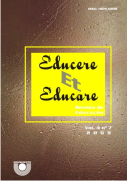POLICIES FOR EDUCATION AND TRAINING POLICY: OPPORTUNITIES AND CHALLENGES FOR THE COURSE PEDAGOGY
DOI:
https://doi.org/10.17648/educare.v6i12.5150Keywords:
universidade, diretrizes curriculares, sujeito político, pedagogoAbstract
The educational policy for teacher education in Brazil is normalized by curriculum guidelines and has been influenced by educational proposals of international organizations. Concerned with the education for citizenship our studies were turn to the political education of educators, specifically in pedagogy courses. Our goal is to discuss the formation of the educator through a documentary analysis of the Pedagogy National Curriculum Guidelines (DCN's), seeking to articulate the possibility of a political education in college. We began this article discussing the social responsibility the university to educate the professional politically and critically, based in Sobrinho (2005) and Santos (2005). The direction of politics and action and political constitution of the subject was articulated from the thoughts of Arendt (1998, 2008) and Novaes (2007). This theoretical framework allows us to present the results of the analysis of DCN's. The study indicates some contradictions that permeate higher education. One of the aspects concerns the fragility of pedagogical political education another refers to the university, even established by rules norms, is also produced as an instituting collective subject.Downloads
Published
10-06-2011
How to Cite
OLIVEIRA, R. G. de; BORSSOI, B. L.; GENRO, M. E. H. POLICIES FOR EDUCATION AND TRAINING POLICY: OPPORTUNITIES AND CHALLENGES FOR THE COURSE PEDAGOGY. Educere et Educare, [S. l.], v. 6, n. 12, 2011. DOI: 10.17648/educare.v6i12.5150. Disponível em: https://saber.unioeste.br/index.php/educereeteducare/article/view/5150. Acesso em: 3 dec. 2025.
Issue
Section
Núcleo Temático: Políticas para Educação Superior e Formação de Professores
License
Aviso de Direito Autoral Creative Commons
Política para Periódicos de Acesso Livre
Autores que publicam nesta revista concordam com os seguintes termos:
1. Autores mantém os direitos autorais e concedem à revista o direito de primeira publicação, com o trabalho simultaneamente licenciado sob a Licença Creative Commons Attribution que permite o compartilhamento do trabalho com reconhecimento da autoria e publicação inicial nesta revista.2. Autores têm autorização para assumir contratos adicionais separadamente, para distribuição não-exclusiva da versão do trabalho publicada nesta revista (ex.: publicar em repositório institucional ou como capítulo de livro), com reconhecimento de autoria e publicação inicial nesta revista.
3. Autores têm permissão e são estimulados a publicar e distribuir seu trabalho online (ex.: em repositórios institucionais ou na sua página pessoal) a qualquer ponto antes ou durante o processo editorial, já que isso pode gerar alterações produtivas, bem como aumentar o impacto e a citação do trabalho publicado (Veja O Efeito do Acesso Livre).
Licença Creative Commons
Esta obra está licenciada com uma Licença Creative Commons Atribuição-NãoComercial-CompartilhaIgual 4.0 Internacional, o que permite compartilhar, copiar, distribuir, exibir, reproduzir, a totalidade ou partes desde que não tenha objetivo comercial e sejam citados os autores e a fonte.


